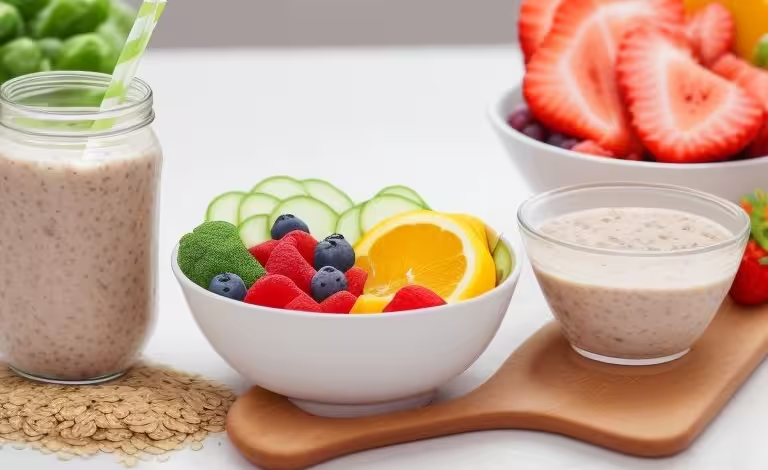
7 Simple Eating Habits for a Healthier You
Eating healthy doesn’t have to be complicated. Sometimes, making small changes to your eating habits can lead to big improvements in your overall health. In this guide, we’ll explore seven simple eating habits that can help you feel better and live healthier. Whether you’re trying to lose weight, boost energy, or just improve your diet, these tips are easy to follow and effective. Let’s dive into these straightforward strategies for healthier eating!

1. Start Your Day with a Balanced Breakfast
Breakfast is often called the most important meal of the day, and for good reason. Eating a balanced breakfast can kickstart your metabolism and give you the energy you need to tackle the day. Aim for a breakfast that includes a mix of protein, whole grains, and healthy fats. For example, try oatmeal topped with nuts and berries, or a smoothie made with yogurt, spinach, and fruit.
Why It Works: Eating a nutritious breakfast helps regulate your blood sugar levels and reduces the likelihood of overeating later in the day. It also provides your body with essential nutrients after a night of fasting.
Quick Tip: Plan your breakfast the night before to save time in the morning. Overnight oats or a pre-made smoothie can be ready to go as soon as you wake up.
2. Drink More Water
Staying hydrated is crucial for your overall health. Drinking plenty of water can help with digestion, improve your skin, and keep you feeling full. Aim to drink at least eight 8-ounce glasses of water a day, and more if you’re active or live in a hot climate.
Why It Works: Water helps flush out toxins, supports digestion, and can even help control your appetite. Sometimes, thirst can be mistaken for hunger, leading to unnecessary snacking.
Quick Tip: Carry a reusable water bottle with you to make it easier to drink water throughout the day. Add a slice of lemon or cucumber for a refreshing twist.
3. Practice Mindful Eating
Mindful eating involves paying full attention to your food and how you eat. This means eating slowly, savoring each bite, and listening to your body’s hunger and fullness cues. By practicing mindful eating, you can improve your relationship with food and prevent overeating.
Why It Works: Mindful eating helps you become more aware of your eating habits and makes it easier to enjoy your meals. It can also help you recognize when you’re truly hungry versus eating out of boredom or stress.
Quick Tip: Try to eat without distractions, like TV or smartphones. Focus on the flavors and textures of your food, and take your time with each meal.
4. Include More Fruits and Vegetables
Adding more fruits and vegetables to your diet is one of the easiest ways to improve your nutrition. These foods are packed with vitamins, minerals, and fiber, which are essential for good health. Aim to fill half your plate with fruits and veggies at each meal.
Why It Works: Fruits and vegetables are low in calories and high in nutrients. They help with digestion, boost your immune system, and can reduce the risk of chronic diseases.
Quick Tip: Keep pre-cut veggies and fruit in the fridge for quick and easy snacks. Add a salad or veggie side to your meals to increase your intake.
5. Choose Whole Grains Over Refined Grains
Whole grains, like brown rice, quinoa, and whole wheat, are a better choice than refined grains. Whole grains contain more fiber and nutrients, which can help keep you full and support digestion. Switch out white bread and pasta for their whole grain counterparts for a healthier option.
Why It Works: Whole grains have more fiber, which aids in digestion and helps regulate blood sugar levels. They also provide more vitamins and minerals compared to refined grains.
Quick Tip: Look for “100% whole grain” or “100% whole wheat” on food labels to ensure you’re choosing whole grain products.
6. Control Portion Sizes
Overeating can be a common issue, even with healthy foods. To avoid this, pay attention to portion sizes and listen to your body’s hunger cues. Using smaller plates and bowls can help you manage portion sizes and prevent overeating.
Why It Works: Controlling portion sizes helps you maintain a balanced diet and avoid consuming too many calories. It also helps you enjoy your food without feeling stuffed.
Quick Tip: Try using smaller plates or measuring out your food to better understand portion sizes. Eating slowly and savoring your food can also help you feel more satisfied with less.
7. Limit Processed Foods and Added Sugars
Processed foods and those with added sugars can be high in unhealthy fats, sodium, and empty calories. Reducing your intake of these foods can help improve your overall health and support weight management. Instead, focus on whole, unprocessed foods like lean proteins, fruits, and vegetables.
Why It Works: Processed foods often contain unhealthy ingredients that can lead to weight gain and other health issues. By limiting these foods, you’re more likely to meet your nutritional needs and maintain a healthier diet.
Quick Tip: Check food labels for added sugars and opt for products with fewer processed ingredients. Cooking at home with fresh ingredients can also help you avoid processed foods.
Adopting simple eating habits can make a big difference in your health and well-being. By starting your day with a balanced breakfast, drinking more water, practicing mindful eating, including more fruits and vegetables, choosing whole grains, controlling portion sizes, and limiting processed foods, you can set yourself up for a healthier lifestyle. Remember, small changes can lead to significant improvements over time. Start with one or two of these habits, and gradually incorporate more as you feel comfortable. Your body will thank you for it!
By implementing these simple eating habits, you’re taking a positive step toward a healthier you. Share these tips with friends and family to spread the word about easy ways to improve nutrition and well-being. Happy eating!


